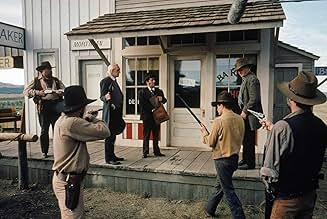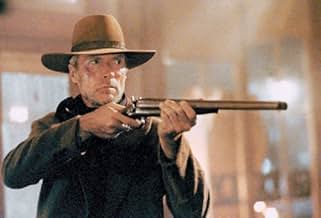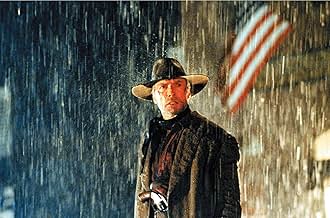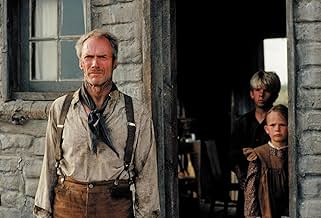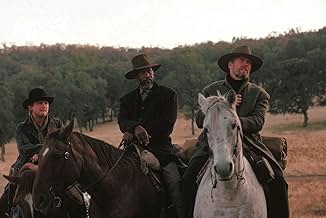Un ex-bandit armé à la retraite, William Munny, accepte à contrecœur un dernier travail, avec l'aide de son ancien partenaire Ned Logan et d'un jeune homme, The "Schofield Kid".Un ex-bandit armé à la retraite, William Munny, accepte à contrecœur un dernier travail, avec l'aide de son ancien partenaire Ned Logan et d'un jeune homme, The "Schofield Kid".Un ex-bandit armé à la retraite, William Munny, accepte à contrecœur un dernier travail, avec l'aide de son ancien partenaire Ned Logan et d'un jeune homme, The "Schofield Kid".
- Réalisation
- Scénario
- Casting principal
- Récompensé par 4 Oscars
- 52 victoires et 47 nominations au total
- Little Sue
- (as Tara Dawn Frederick)
- Will Munny
- (as Shane Meier)
Résumé
Avis à la une
Eastwood stars as William Munny a retired gunslinger with a guilt-filled past. He lives alone with his two children and grave of his young wife outside. One day a young cowboy, The Schofield Kid (Jaimz Woolvett), comes in need of his service to hunt down some men who cut up a whore. William reluctantly accepts and with the help of Ned Logan (Morgan Freeman) they work together to track down the criminals. Meanwhile, the sheriff of the town, Little Bill Daggett (Gene Hackman) is also looking for them. This then leads to a bloody showdown climax, welcoming back a sort of 'Man With No Name' character to the genre.
William Munny is a cold-blooded killer. The Schofield Kid wants to be one. But, all the murders and sins Munny used to commit has affected him in an extraordinary way. He takes no hesitation in killing. In the climax he just walks past a man he shot who didn't die and shoots him dead. It may sound like nothing now, but he just took a life for no apparent reason. When the Kid kills his first man, of which deserved it, he hesitates. This is The Kid who is so eager to kill people as he thinks it will make him a man. But after the assassination, he breaks down. He realized what he had done. He had wiped another man of the earth. And Munny does it with ease. So does Little Bill. He is a violent and brutal cop who uses torture to get what he wants from the prisoners. Logan also finds it hard to take lives.
The film studies on how much a life is worth. Sometimes it is worthless (see Tarantino or Scorsese films) and sometimes it is a major feature. Usually a film only does one. Unforgiven does both. A life isn't worth the same amount to each person. When a life is taken, it is the killer who decides how much it is worth by how much it affects him. Whether he just lets it slide (Munny and Little Bill) or kills someone and calls it a day (Kid and Logan), because they can't bring themselves to forgetting it. This is the most thought-provoking thing for me personally, ever.
Unforgiven in my opinion is the greatest western. Actually, its the greatest film of all-time. It shows how violent it was back then, and the fact everybody was beaten. It is more realistic than any of Leone's 'Man With No Name' films (though I will admit they were set in a sort of fantasy land). But, Munny is not proud of his violent nature. He blames it on alcohol; which his wife persuaded him to quit to explain why he also gave up being a murderer. The film shows the cowboys as they really are, either cowards or killers. The choice of word 'coward' is to say that they should be killers, as that is apparently what a man is (an exaggeration) as most westerns glorify violence, but the men can't handle it.
Clint Eastwood did an amazing job as William Munny. He showed how he regretted his past very well by admitting to it in a shameful way; like when asked if he killed women and children he replied "I've killed just about anything that walked or crawled at one time or another, and I'm here to kill you ". He even admits that he will meet Little Bill in Hell. Gene Hackman delivers one of the greatest performances of the decade, the tension he makes is incredible. Woolvett and Freeman remain in solid above average performances throughout.
The script, written by David Webb Peoples, buzzed around Hollywood for nearly 20 years, even being rejected by some of the cast, before Eastwood picked it up. Clint Eastwood deserved his Oscar for best direction. The plot flowed fluently with some surprises and memorable lines. An instant classic. The cinematography is much different that of 'The Good, The Bad and The Ugly' or the others westerns Eastwood appeared in. It is a much cleaner and crisp view, yet also being extremely raw. The score, though not used often is very refreshing and moving.
'Unforgiven' is an unforgettable look on life, man and the real west. One of the most powerful films of the '90s. A true triumph exploring important morals. Do not miss it.
9/10
Clint Eastwood signed off from the Western genre with this magnificent 1992 picture, the appropriation and irony of which is in itself a majestic point of reference. After the script had been knocking around for nigh on twenty years (written by Blade Runner scribe David Webb Peoples), Eastwood seized the opportunity to play William Munney and lay bare the mythologies of the Wild West.
It's striking that the makers here have lured us in to being firmly on Munney's side, we are, incredibly, influenced by Eastwood's part in the history of the Western. In spite of Munney's obvious murky past (despicable crimes they be), we wait (and hope) for Munney to make a quip and way lay the bad guys - in fact salivating at the prospect is probably closer to the truth. So it's with enormous credit that Eastwood, and his magnificent cast and crew, manage to fuddle all our respective perceptions of the West and the characters we ourselves have aged with.
It's not for nothing that W.W. Beauchamp (Saul Rubinek) is one of the critical characters on show, this even though we didn't expect that to be the case. Beauchamp is a writer of penny pulpy novels that tell of derring-do heroics, gunslingers with a glint in their eye who deal death as some sort of heroic encore. This gives Unforgiven an excellent sleight of hand, for this West is grim and a destroyer of all illusions and it's not controversial to say that this is indeed a good thing.
Eastwood is greatly served by the actors around him, Morgan Freeman, Gene Hackman (winning the Best Supporting Actor Oscar for a script he turned down many years before!), Rubinek, Frances Fisher, Anna Thomson, Jaimz Woolvett and an incredible cameo from Richard Harris. Along with Hackman's win for his brutally tough portrayal of Sheriff "Little Bill" Daggett, Unforgiven also won Oscars for Eastwood for his clinically tight direction, Best Picture, Best Editing and it was nominated in another five categories. One of those nominations was for Jack Green's cinematography, which now, in this age of High Definition enhanced cinema, can be seen in all its wonderful glory. The Alberta location is magically transformed into the Western frontier, with the orange and brown hues a real treat for the eyes.
Ultimately though, Unforgiven is a lesson in adroit film making, where across the board it works so well. Why? Well because the man at the helm knows this genre inside out, he was after all the sole flag bearer for practically 25 years. He learnt from his peers, and thus Eastwood has crafted a thematically complex piece that for all its violence, debunking and melancholy pulse beats, is a film that is as beautiful as it is most assuredly stark. An incredible and true highlight of modern day cinema, regardless of being a genre fan or not. 10/10
Kevin Costner tries hard but he just doesn't get it. Dances With Wolves wasn't really a western. It wasn't even an anti-western. It was more like a political indictment of the actions of the Americans of the time. For all that I did enjoy it.
Most of the others since Unforgiven are movies where somebody decides to put the characters on a horse, but the story is just generic pap. Nobody has the balls to make something with a meaning.
I will grant that Deadwood is a truly excellent series but it isn't a movie.
That's why I believe that Unforgiven is a fitting end to the western genre. I won't get all rhapsodic and spout a bunch of crap about how Clint made this movie as a symbol of the end of the western. Cuz that's a load of crap. The script had been around since the early 70s when things were still going strong. What it is, is a movie that shows us that there is no black and white in any time. There are only shades of grey.
It is also just as dirty and violent as things actually were for most people in that era. Life was comparatively cheap and most people didn't have much hope of justice. The middle class was very small and the upper class was tiny. The vast majority belonged to the under-classes.
Good guys didn't wear white hats and not every sheriff was a good guy. Some were violent and corrupt braggarts and bullies. Little Bill mocks English Bob's self-promotion, but at the same time he knocks Bob down he builds himself up. He doesn't bother with courts or judges and he is his own executioner. He isn't motivated by any innate sense of justice when he deals with any criminal elements. It's more that he takes it as an insult to his own power.
William Munny is a killer, plain and simple. He has human feelings but basically he is unrepentant. He changed for his wife, but like many changes it wasn't permanent. He won't sleep with a whore but when he needs money he is willing to kill for it. At the same time he treats the whore with kindness and is loyal to his friend. And somehow he managed to get a good woman to love him. A classic anti-hero.
Rather than being about the end of the Western genre I believe that it is actually an ode to what came before it. Sergio Leone would have been proud.
Eastwood puts in an astonishing performance as the retired killer Muny, saved from his life of thievery and murder by his late wife. Now, desperately trying to support his children with no income, he is tempted back to his killing ways by the bounty offered by the women of a brothel, one of whom's number has been savagely beaten and disfigured by a drunken ranch-hand.
The film follows Eastwood as he wrestles with his desire to honour his wife's memory and his need to feed his children by returning to the killer that, he fears, is his true nature. Meanwhile word of the bounty has spread and the events spiral out of control as the sheriff (Gene Hackman) deals with the guns for hire that ride into town.
While all the supporting cast are excellent Gene Hackman's Oscar winning performance even manages to eclipse Eastwoods as the brutal Sheriff. He beats one of the bounty hunters, English Bob (Richard Harris) almost to death and then explains to a journalist, in one of the film's stand out scenes, how men like he and Muny are so successful at killing. The mood moves from light banter to life threatening seriousness...and back again, with just one move of his head.
One of the greatest Westerns ever made? Certainly. Although the fact it's a western is really secondary. In truth it's a tale of the nature of evil and the nature of man. Eastwood uses the gap between the western myth and reality as an arena to play out his story and does so with consummate style.
Oscars Best Picture Winners, Ranked
Oscars Best Picture Winners, Ranked
Le saviez-vous
- AnecdotesDirector Clint Eastwood dedicated the film to directors and mentors Sergio Leone and Don Siegel. The final screen credit reads, "Dedicated to Sergio and Don."
- GaffesEnglish Bob says that no assassin would dare hold a gun to a monarch. There were, in fact, six assassination attempts made against Queen Victoria, and they were well known at the time. He certainly would have known about them. However, it should be noted that English Bob was mainly saying this to antagonize people and not necessarily because he truly believed it.
- Citations
Little Bill Daggett: You'd be William Munny out of Missouri. Killer of women and children.
Will Munny: That's right. I've killed women and children. I've killed just about everything that walks or crawled at one time or another. And I'm here to kill you, Little Bill, for what you did to Ned.
- Crédits fousAt the end of the credits, there is caption reading, "Dedicated to Sergio and Don". This is a reference to late directors Sergio Leone (who directed Clint Eastwood in the Dollars trilogy) and Don Siegel (who directed Eastwood in Dirty Harry and Escape from Alcatraz).
- Versions alternativesThe end credits in the current TV prints contain a black screen in addition the 2018 Warner Bros. Pictures plaster.
- ConnexionsFeatured in Clint Eastwood on Westerns (1992)
Meilleurs choix
- How long is Unforgiven?Alimenté par Alexa
- What is 'Unforgiven' about?
- Is "Unforgiven" based on a book?
- Is the character Will Munny based on a real person?
Détails
Box-office
- Budget
- 14 400 000 $US (estimé)
- Montant brut aux États-Unis et au Canada
- 101 167 799 $US
- Week-end de sortie aux États-Unis et au Canada
- 15 018 007 $US
- 9 août 1992
- Montant brut mondial
- 159 167 799 $US
- Durée2 heures 10 minutes
- Couleur
- Rapport de forme
- 2.39 : 1
Contribuer à cette page






